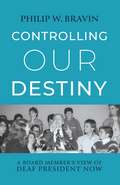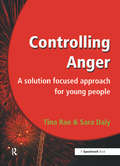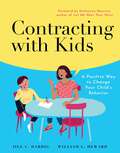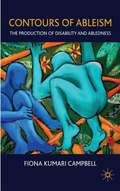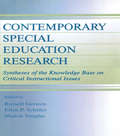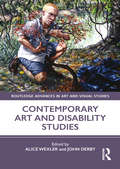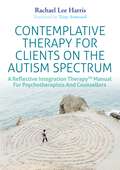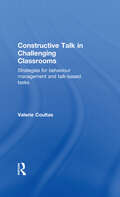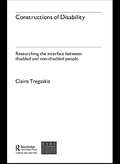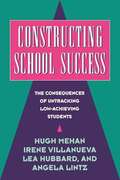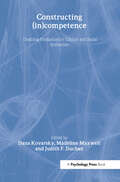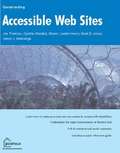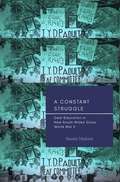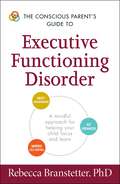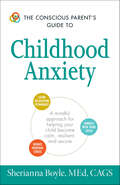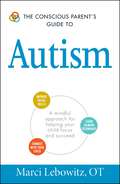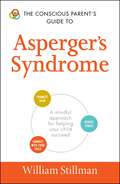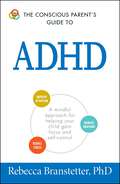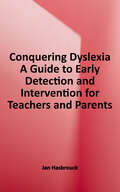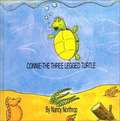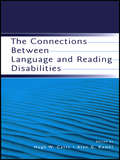- Table View
- List View
Controlling Our Destiny: A Board Member’s View of Deaf President Now
by Philip W. BravinIn March 1988, students at Gallaudet University led a successful protest to demand the selection of the university’s first deaf president. The Deaf President Now (DPN) movement was a watershed event in American deaf history; it achieved self-governance for the deaf community and placed Gallaudet in the center of a national media spotlight. Controlling Our Destiny is Philip Bravin’s personal perspective of these momentous events. A lifelong member of the deaf community and proud Gallaudet alumnus, Bravin was a member of the Gallaudet University Board of Trustees and the chair of the presidential search committee during DPN. Although the deaf community had been strongly advocating for a deaf president to lead the university, the board (which had a hearing majority) selected the lone hearing candidate. Bravin recounts the discussions and decision-making that happened behind the scenes leading up to and following the ill-fated announcement. He reflects on the integrity of the process and the internal conflict he experienced as a deaf person who supported a deaf president yet felt compelled to abide by his duties as a board member. After the protests, his leadership was recognized when he was selected as the first deaf chair of the board. Photographs and documents add depth to Bravin’s account, many of which will be seen by the public for the first time. I. King Jordan, the first deaf president of Gallaudet, provides a foreword in which he shares his own unique insight into these events. Controlling Our Destiny captures the energy and the urgency of DPN. Readers will understand the complexities of the presidential search process and the cultural and historical contexts that triggered the protest. Bravin’s memoir contemplates power, access, community, and the enduring legacy of a movement that inspired deaf people around the world.
Controlling Anger: A Solution Focused Approach for Young People
by Tina Rae Sara DalyMany pupils experience difficulty in controlling their strong feelings and in managing conflict in both school and home settings. This programme aims to help young people: * avoid or manage situations of conflict * understand that they can create change * realise that it is possible to resolve difficulties and achieve a positive outcome. In this thoughtful approach to anger management, the authors suggest a teaching and learning model and use 'story' as the focus of pupil engagement. The book uses eight newspaper articles to help pupils to develop emotional literacy through subjects such as: * Road rage * racist incidents * Happy slapping * street fights. During the 10 session programme young people will: * understand anger in a variety of situations * learn about physiological and behavioural aspects of anger * rehearse coping strategies * plan positive responses to provocative situations. This book offers teachers and non-teaching staff a practical, exciting and well-designed resource with full facilitator notes and all handout materials printable from the downloadable resources.
Contracting with Kids: A Positive Way to Change Your Child's Behavior
by Jill C. Dardig William L. Heward"Colorful and easy to implement, this book will be a resource for parents and guardians looking to try behavior contracting in their homes." —Library Journal When a child is struggling with a behavior challenge or wants to learn a new skill, a contract can be a surprisingly effective solution that leads to more peaceful family dynamics. To help families create contracts as a collaborative process, Contracting with Kids offers an innovative combination of how-to text for parents and illustrated stories for children. Contracting with Kids describes a straightforward, four-step solution called behavioral contracting, a research-based technique with proven real-world success. Contracts are a tool that can benefit anyone, but they&’re particularly useful for: Autistic children Children with learning or developmental disabilities Children who benefit from clear expectations and receiving positive feedback and rewards The book&’s beautifully illustrated stories show a diverse group of families using contracts to address common problems such as: Completing chores or homework Getting along with siblings Becoming independent Achieving personal goals Questions after each story are designed to spark age-appropriate discussions. Sample contracting forms and supporting materials are provided in the book and also on a companion website.
Contours of Ableism: The Production of Disability and Abledness
by Fiona Kumari CampbellExamining what the study of disability tells us about the production, operation and maintenance of ableism, this ambitious study explores the ways abledness is understood. It provides new directions in research on 'aberrancy' and its focus on a normative ethos. Reconfiguring, challenging and extending the boundaries of a disability studies perspective, Contours of Ableism explores territories of ableism in the themes of embodiment, subjectivity, transhumanism, technologies and jurisprudence.
Contemporary Special Education Research: Syntheses of the Knowledge Base on Critical Instructional Issues (The LEA Series on Special Education and Disability)
by Russell Gersten Ellen P. Schiller Sharon VaughnConsiderable research in the past 30 years has accumulated regarding the academic and social functioning of youngsters with disabilities. Only in the past decade has there been sufficient special education research published from which meta-analyses and syntheses can be conducted. In this volume, seven sets of authors grapple with synthesizing the knowledge base on an array of critical topics in the field of special education. Among others, specific chapters include: * a synthesis of what is known about effective instructional grouping practices for reading. * an examination of the differences between students classified as learning disabled and other low-achieving students on a range of academic performance measures. * a review of effective instruction for English-language learners. * an examination of the research on behavioral supports for low-incidence special education populations. * a synthesis on how technology supports literary development, across the full spectrum of disabilities categories. These papers provide up-to-date, informative summaries of current knowledge and a base from which further venture into the critical area of instructional intervention in special education can occur.
Contemporary Art and Disability Studies (Routledge Advances in Art and Visual Studies)
by Alice Wexler John DerbyThis book presents interdisciplinary scholarship on art and visual culture that explores disability in terms of lived experience. It will expand critical disability studies scholarship on representation and embodiment, which is theoretically rich, but lacking in attention to art. It is organized in five thematic parts: methodologies of access, agency, and ethics in cultural institutions; the politics and ethics of collaboration; embodied representations of artists with disabilities in the visual and performing arts; negotiating the outsider art label; and first-person reflections on disability and artmaking. This volume will be of interest to scholars who study disability studies, art history, art education, gender studies, museum studies, and visual culture.
Contemplative Therapy for Clients on the Autism Spectrum: A Reflective Integration Therapy™ Manual for Psychotherapists and Counsellors
by Rachael Lee Harris Tony AttwoodDrawing on the ancient tradition of contemplation, Reflective Integration Therapy™ shows how mantra meditation and reflective therapy can be used with clients with high functioning autism. The Reflective Integration Therapy™ programme uses the cognitive differences in those with autism, such as their innate capacity for silence, withdrawal, intense focus and repetition as sources of therapeutic healing. This manual introduces this fresh, unique therapeutic approach, creating an essential resource for all practitioners working in the field of autism. All the material for twelve weekly sessions of therapy is included within the book.
Constructive Talk in Challenging Classrooms: Strategies for Behaviour Management and Talk-Based Tasks
by Valerie CoultasConstructive Talk in Challenging Classrooms gives the practising teacher advice on how to make learning fun through the use of ‘talk’ and collaborative group work. Using clear examples, tried and tested in some of the most challenging classrooms in inner city schools, the book offers practical and honest advice on both the difficulties and rewards that can be gained when employing all forms of talk-based teaching in the classroom. Packed with real examples of successful talk based lessons with children of all abilities and needs, this book will show teachers how they can succeed in overcoming problems of disruption and engage even the most difficult pupils in real learning through talk. The book shows that bringing the child's individual experience into a lesson through talk has huge emotional and psychological benefits – this can be particularly marked in classrooms where there are low levels of literacy, behaviour issues or where pupils’ first language is not English. The author argues that talk is vital for building positive relationships and essential for successful teaching, particularly in the difficult classrooms. This inspiring title is essential reading for any teacher interested in building trust and making learning fun and meaningful for all.
Constructions of Disability: Researching Inclusion in Community Leisure
by Claire TregaskisThis innovative book discusses the meaning of 'inclusion' through the exploration of the interactions between disabled and non-disabled people at a community leisure centre. By exploring the nature of this interface, an understanding of how people create potential for both disability and inclusion is revealed. This book takes a very different approach to that of existing texts, which have tended to concentrate mainly on disabled people's exclusion. The advantage of this new approach is that it adds an extra dimension to our understanding of how discriminatory practice is variously perpetuated and challenged..Constructions of Disability is valuable reading for all people who are working towards increased social inclusion for disabled people, including theorists and students of disability studies and learning difficulty, leisure management and disability service providers, and their families. Using a practical case study approach, it explores the impact that social interaction between disabled and non-disabled people can have increasing or decreasing disabled people's opportunities for inclusion. Examples of both inclusive and discriminatory practice are described in detail, and the positive and negative effects of these actions on the participants are demonstrated and discussed. This insightful book offers a wide range of practical suggestions for the future development of more inclusive theory, policy and practice.
Constructing School Success: The Consequences of Untracking Low Achieving Students
by Angela Lintz Lea Hubbard Irene Villanueva Hugh MehanBolstering the academic success of low achieving students and providing a more egalitarian classroom setting are two constant challenges to our schools. This book describes the process of "untracking", an educational reform effort that has prepared students from low income, linguistic and ethnic minority backgrounds for college. Untracking offers all students the same academically-demanding curriculum while varying the amount of institutional support they receive. This book is a highly readable account of a successful school reform effort. It provides systematic research results concerning the educational and social consequences of untracking previously low achieving students, and will be of great importance to researchers in educational and social psychology.
Constructing (in)competence: Disabling Evaluations in Clinical and Social interaction
by Judith Felson Duchan Dana Kovarsky Madeline MaxwellCompetence and incompetence are constructs that emerge in the social milieu of everyday life. Individuals are continually making and revising judgments about each other's abilities as they interact. The flexible, situated view of competence conveyed by the research of the authors in this volume is a departure from the way that competence is usually thought about in the fields of communication disabilities and education. In the social constructivist view, competence is not a fixed mass, residing within an individual, or a fixed judgment, defined externally. Rather, it is variable, sensitive to what is going on in the here and now, and coconstructed by those present. Constructions of competence are tied to evaluations implicit in the communication of the participants as well as to explicit evaluations of how things are going. The authors address the social construction of competence in a variety of situations: engaging in therapy for communication and other disorders, working and living with people with disabilities, speaking a second language, living with deafness, and giving and receiving instruction. Their studies focus on adults and children, including those with disabilities (aphasia, traumatic brain injury, augmentative systems users), as they go about managing their lives and identities. They examine the all-important context in which participants make competence judgments, assess the impact of implicit judgments and formal diagnoses, and look at the types of evaluations made during interaction. This book makes an argument all helping professionals need to hear: institutional, clinical, and social practices promoting judgments must be changed to practices that are more positive and empowering.
Constructing Accessible Web Sites
by Paul Bohman Jim Thatcher Cynthia Waddell Shawn Henry Sarah Swierenga Mark Urban Michael BurksA guide to the whys and hows of creating web accessible websites.
A Constant Struggle: Deaf Education in New South Wales Since World War II
by Naomi MaloneDeaf education in New South Wales has made tremendous progress since the end of World War II, yet issues remain for students from their early years of education through secondary high school. Naomi Malone traces the roots of these issues and argues that they persist due to the historical fragmentation within deaf education regarding oralism (teaching via spoken language) and manualism (teaching via sign language). She considers the early prevalence of oralism in schools for deaf students, the integration of deaf students into mainstream classrooms, the recognition of Australian Sign Language as a language, and the growing awareness of the diversity of deaf students. Malone’s historical assessments are augmented by interviews with former students and contextualized with explanations of concurrent political and social events. She posits that deaf people must be consulted about their educational experiences and that they must form a united social movement to better advocate for improved deaf education, regardless of communication approach.
The Conscious Parent's Guide to Executive Functioning Disorder: A Mindful Approach for Helping Your child Focus and Learn
by Rebecca BranstetterHelp your child feel confident and capable!If your child has been given a diagnosis of executive functioning disorder, you may be feeling overwhelmed and unsure of what to do next. You want your child to be able to master certain basic skills, such as being organized, staying focused, and controlling impulses and emotions. But what if your child is having trouble with one or all of these skills? With The Conscious Parent's Guide to Executive Functioning Disorder, you'll learn how to take a relationship-centered approach to parenting as you help improve your child's executive functioning skills:Task initiationResponse inhibitionFocusTime managementWorking memoryFlexibilitySelf-regulationCompleting tasksOrganizationConscious parenting is about being present with your children and taking the time to understand how to help them flourish. With the strategies and advice in this guide, you and your child will build sustainable bonds, develop positive behaviors, and improve executive functioning skills for life. And you'll find that conscious parenting helps create a calm and mindful atmosphere for the whole family, while helping your child feel competent, successful, and healthy.
The Conscious Parent's Guide to Childhood Anxiety: A Mindful Approach for Helping Your Child Become Calm, Resilient, and Secure (Conscious Parenting Relationship Ser.)
by Sherianna BoyleHelp your child feel confident and capable!If your child has been given a diagnosis of anxiety, you may be feeling overwhelmed and unsure of what to do next. With The Conscious Parent's Guide to Childhood Anxiety, you will learn how to take a relationship-centered approach to parenting that engages your child and ensures that he succeeds behaviorally, socially, and cognitively. Conscious parenting is about being present with your child and taking the time to understand how to help him flourish. By practicing this mindful method, you can support your child emotionally and help nurture his development.This easy-to-use guide helps you to:Communicate openly with your child about anxietyBuild a supportive home environmentDetermine your child's anxiety triggersLearn strategies that will help your child release anxiety and feel calmTeach your child long-term coping skillsDiscipline your child without increasing his anxietyEducate and work with teachers and school officialsWith The Conscious Parent's Guide to Childhood Anxiety, you will learn to create a calm and mindful atmosphere for the whole family, while helping your child feel competent, successful, and healthy.
The Conscious Parent's Guide to Autism
by Marci LebowitzHelp your child feel confident and capable!If your child has a diagnosis of "on the autism spectrum," you may be feeling overwhelmed and most likely intimated. Often the focus is on "disabilities" rather than "abilities," and you may be left wondering what you should expect as your child journeys through life. With The Conscious Parent's Guide to Autism, you will learn how to take a relationship-centered approach to engage your child. Conscious parenting means being present with your children and taking the time to understand their point of view. Using this mindful method, you can help your child improve language skills, motor skills, and social skills.You'll also learn how to:Honor your child's unique perspective and cognitive strengthsAdapt a conscious parenting philosophy that works for everyoneIdentify triggers that can lead to sensory overloadHelp your child feel in control with calming routinesLower stress levels for the entire family, including other siblingsEducate your family and friends about autismAdvocate for your childFind ways to improve communicationWith The Conscious Parent's Guide to Autism, you'll learn to create a calm and mindful atmosphere for the whole family, while helping your child succeed and thrive.
The Conscious Parent's Guide to Autism: A Mindful Approach for Helping Your Child Focus and Succeed
by Marci LebowitzHelp your child feel confident and capable!If your child has a diagnosis of "on the autism spectrum," you may be feeling overwhelmed and most likely intimated. Often the focus is on "disabilities" rather than "abilities," and you may be left wondering what you should expect as your child journeys through life. With The Conscious Parent's Guide to Autism, you will learn how to take a relationship-centered approach to engage your child. Conscious parenting means being present with your children and taking the time to understand their point of view. Using this mindful method, you can help your child improve language skills, motor skills, and social skills.You'll also learn how to:Honor your child's unique perspective and cognitive strengthsAdapt a conscious parenting philosophy that works for everyoneIdentify triggers that can lead to sensory overloadHelp your child feel in control with calming routinesLower stress levels for the entire family, including other siblingsEducate your family and friends about autismAdvocate for your childFind ways to improve communicationWith The Conscious Parent's Guide to Autism, you'll learn to create a calm and mindful atmosphere for the whole family, while helping your child succeed and thrive.
The Conscious Parent's Guide To Asperger's Syndrome
by William StillmanA positive, mindful plan for the whole family!If your child has been given a diagnosis of Asperger's syndrome, you may be feeling overwhelmed and unsure of what to do next. With The Conscious Parent's Guide to Asperger's Syndrome, you will learn how to take a relationship-centered approach to parenting that engages your child and ensures that he succeeds behaviorally, socially, and cognitively. Conscious parenting is about being present with your child and taking the time to understand how to help him flourish. By practicing this mindful method, you can support your child emotionally and help nurture his development.This easy-to-use guide helps you to:Honor your child's unique perspective and cognitive strengthsAdapt a conscious parenting philosophy that works for everyoneIdentify triggers that can lead to sensory overloadLower stress levels for the entire family, including other siblingsKeep open communication with your child and help him foster good relationshipsEmbrace your child's passions and help him grow in practical waysEducate your family and friends about Asperger'sAdvocate for your child at schoolWith The Conscious Parent's Guide to Asperger's Syndrome, you'll learn to create a calm and mindful atmosphere for the whole family, while helping your child succeed and thrive.
The Conscious Parent's Guide To Asperger's Syndrome: A Mindful Approach for Helping Your Child Succeed
by William StillmanA positive, mindful plan for the whole family!If your child has been given a diagnosis of Asperger's syndrome, you may be feeling overwhelmed and unsure of what to do next. With The Conscious Parent's Guide to Asperger's Syndrome, you will learn how to take a relationship-centered approach to parenting that engages your child and ensures that he succeeds behaviorally, socially, and cognitively. Conscious parenting is about being present with your child and taking the time to understand how to help him flourish. By practicing this mindful method, you can support your child emotionally and help nurture his development.This easy-to-use guide helps you to:Honor your child's unique perspective and cognitive strengthsAdapt a conscious parenting philosophy that works for everyoneIdentify triggers that can lead to sensory overloadLower stress levels for the entire family, including other siblingsKeep open communication with your child and help him foster good relationshipsEmbrace your child's passions and help him grow in practical waysEducate your family and friends about Asperger'sAdvocate for your child at schoolWith The Conscious Parent's Guide to Asperger's Syndrome, you'll learn to create a calm and mindful atmosphere for the whole family, while helping your child succeed and thrive.
The Conscious Parent's Guide To ADHD
by Rebecca BranstetterAn integrative method for helping children focus and learn!If your child has been given a diagnosis of ADHD, you may be feeling overwhelmed and unsure of what to do next. With The Conscious Parent's Guide to ADHD, you will learn how to take a relationship-centered approach to parenting that engages your child and ensures that he succeeds behaviorally, socially, and cognitively. Conscious parenting is about being present with your child and taking the time to understand how to help him flourish. By practicing this mindful method, you can support your child emotionally and help nurture his development.With this all-in-one guide, you can create a plan that not only addresses the challenges a child with ADHD faces, but also creates a mindful, less stressful atmosphere for the whole family.You'll be able to:Honor your child's unique learning styleAdapt a conscious parenting philosophy that works for everyoneUnderstand treatment options and weigh the pros and cons of medicationLower stress levels for the entire family, including other siblingsLearn how a mindful approach can be combined with other treatmentsHelp your child focus at home and schoolFocus on your child's strengths as well as weaknessesEncourage your child to achieve his goalsWhen both you and your child are more mindful and relaxed, your child can learn to focus, gain independence, and thrive both in school and out.
The Conscious Parent's Guide To ADHD: A Mindful Approach for Helping Your Child Gain Focus and Self-Control
by Rebecca BranstetterAn integrative method for helping children focus and learn!If your child has been given a diagnosis of ADHD, you may be feeling overwhelmed and unsure of what to do next. With The Conscious Parent's Guide to ADHD, you will learn how to take a relationship-centered approach to parenting that engages your child and ensures that he succeeds behaviorally, socially, and cognitively. Conscious parenting is about being present with your child and taking the time to understand how to help him flourish. By practicing this mindful method, you can support your child emotionally and help nurture his development.With this all-in-one guide, you can create a plan that not only addresses the challenges a child with ADHD faces, but also creates a mindful, less stressful atmosphere for the whole family.You'll be able to:Honor your child's unique learning styleAdapt a conscious parenting philosophy that works for everyoneUnderstand treatment options and weigh the pros and cons of medicationLower stress levels for the entire family, including other siblingsLearn how a mindful approach can be combined with other treatmentsHelp your child focus at home and schoolFocus on your child's strengths as well as weaknessesEncourage your child to achieve his goalsWhen both you and your child are more mindful and relaxed, your child can learn to focus, gain independence, and thrive both in school and out.
The Conquest of Blindness: An Autobiographical Review of the Life and Work of Henry Randolph Latimer
by Henry Randolph Latimer<P>The term "Conquest of Blindness" is taken to include any preventive, remedial, educational, rehabilitating, or relief phase of work pertaining to the handicap of blindness. <P>The primary aim of the volume is to lift work for the conquest of blindness out of the miasma of alms and asylums into the more wholesome atmosphere of social adjustment. <P>Other aims of the volume are to serve as a supplementary text for the use of the profession, and as an incentive to the chance reader to delve more deeply into the subject, and to present as modestly as may be the autobiography of one blind person who has contributed in small measure toward the conquest of blindness.
Conquering Dyslexia: A Guide to Early Detection and Intervention for Teachers and Parents
by Jan HasbrouckDyslexia is no longer a mystery. MRI scans and other tools of neuroscience have advanced our understandings in the last decade. We now know what to do to help students become skilled, confident learners. In Conquering Dyslexia, Dr. Hasbrouck shares the instructional approaches that work best for children who have this disorder, and the most current information for parents so they can advocate for their children and communicate with educators effectively. This book addresses: - What is dyslexia? - How to identify it - Early diagnosis and intervention - Teaching students - Supporting English Learners PRAISE FOR CONQUERING DYSLEXIA A thoroughly practical book that translates the science of reading and what we know about dyslexia into practice. A must-read for teachers, practitioners, administrators, and others on the frontline of teaching all children to read. Jack M. Fletcher, Ph.D., ABPP (ABCN) Hugh Roy and Lillie Cranz Cullen Distinguished Professor University of Houston
Connie: The Three Legged Turtle
by Nancy NorthropConnie, a turtle with only three legs, teaches readers that the best thing they can do is always do their best even when it isn't easy or fun. Connie proves herself as a Handi and Abled friend saving the day in a terrible storm. And she does it with only three legs.
The Connections Between Language and Reading Disabilities
by Hugh W. Catts Alan G. KamhiThis is an edited book based on papers presented at a 2003 invitee-only conference under the sponsorship of the Merrill Advanced Studies Center of the University of Kansas. The participants were prominent scholars in the areas of language and reading, and have research programs funded by NIH and other sources. The purpose of the gathering was to discuss theoretical issues and research findings concerning the relationship between developmental language and reading disabilities, specifically looking at neurological, behavioral, and genetic factors. In addition, it discussed other factors contributing to reading difficulties in the middle elementary school years through adolescence and literacy outcomes for children with early language impairments, and how these problems relate to children with dyslexia. The Foreword is written by Reid Lyon, Branch Chief, Child Development and Behavior Branch, NICHD-National Institutes of Health.This book appeals to scholars in the areas of language disorders and reading disabilities, as well as to practicing speech-language pathologists, special educators, and reading specialists. It may also be used in graduate courses designed as seminars in either language disorders or reading disabilities in schools of communication disorders, as well as schools of education--especially special education departments.
